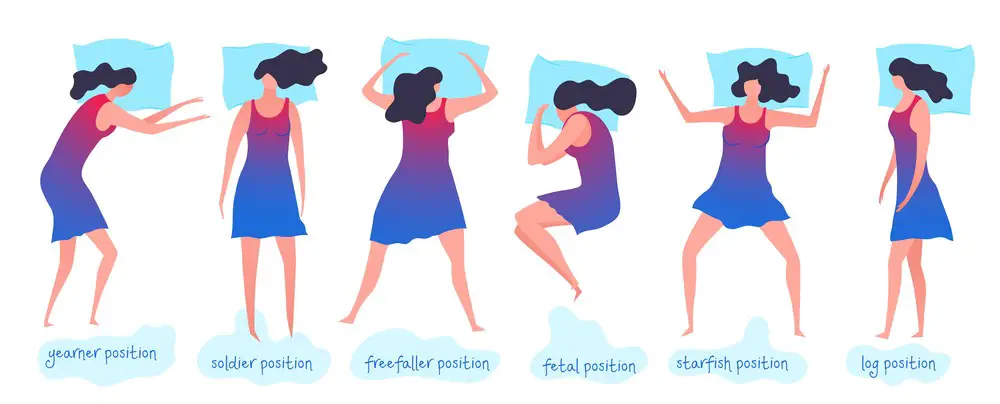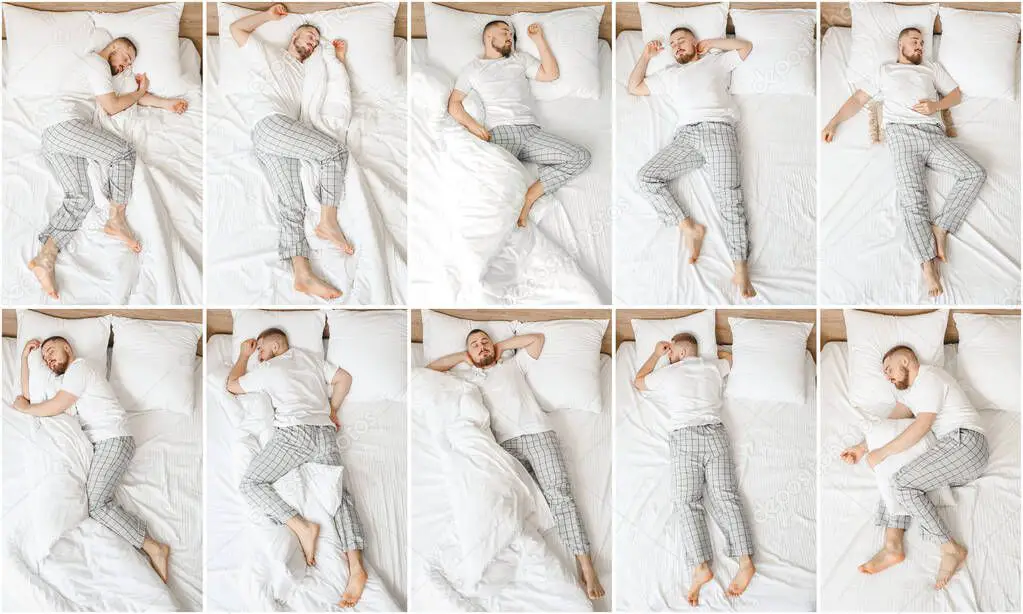As a BetterHelp affiliate, we receive compensation from BetterHelp if you purchase products or services through the links provided
In the labyrinth of sleep, where dreams intertwine with the mysteries of the subconscious, even the direction in which we lay our heads can hold profound significance. Welcome to the world of sleeping direction – a fascinating aspect of our nightly routines that has captured the curiosity of cultures and traditions for centuries. But what does science have to say about the impact of our head’s orientation on health and sleep quality? In this discussion, we’ll explore the age-old beliefs and contemporary insights regarding sleeping direction and its potential effects on well-being. So, let’s unravel the secrets of the compass of dreams and its influence on the realm of slumber.
The Impact Of Sleeping Direction On Health
The position you sleep in can significantly affect both your quality of sleep and your overall health. Inadequate sleeping posture can lead to issues such as back and neck discomfort, tiredness, sleep apnea, muscle cramps, restricted blood flow, headaches, acid reflux, digestive problems, and even early onset of wrinkles.

The Role Of Direction In Sleep Quality
Some studies have found that people who sleep with their head facing north tend to have the best sleep quality. Others have found that facing east or west is better for sleep quality. It is thought that this may be because of how the earth’s magnetic field affects our bodies.
How Direction Affects Sleep Cycles
The direction in which you sleep can influence your sleep cycles. Some believe that aligning your head with specific cardinal directions (e.g., north or east) may promote better sleep quality by enhancing the alignment of your body with the Earth’s magnetic field. This alignment can potentially lead to more restful and restorative sleep.
Relationship Between Direction And Body Alignment
Sleep direction can also impact body alignment during sleep. Your sleep posture, including the orientation of your head, may affect spinal alignment, muscle tension, and overall comfort. Proper alignment can reduce the risk of waking up with aches and pains and contribute to overall health and well-being.
Also Read: Can You Sleep with a Mask On? Exploring Benefits and Precautions
 Scientific Studies And Findings
Scientific Studies And Findings
One study found that people who slept with their heads facing north had better cardiovascular health and lower blood pressure than those who slept with their heads facing east or west. Another study found that people who slept with their heads facing north had less cortisol (a stress hormone) in their saliva. This suggests that sleeping in the north direction may positively impact stress levels.
Research On Sleep Direction
Scientific studies on the relationship between sleep direction and health are limited and inconclusive. Some research has explored the impact of geomagnetic forces on sleep, but findings have yet to provide definitive evidence to support specific sleeping directions as universally superior for everyone.
Health Outcomes Associated With Different Directions
Various sleeping positions can have different effects on your health:
- Fetal Position: Curling up tightly in a fetal position can restrict deep breathing and lead to morning joint pain and stiffness.
- Freefall Position: Lying face down in the freefall position can worsen neck and back issues and leave you feeling sore and tired in the morning.
- Soldier Position: Sleeping in a soldier position can exacerbate snoring, sleep apnea, and back pain.
- Log Position: Sleeping like a log might result in stiffness and tightness in the shoulder and jaw on that side.
Choosing The Best Sleeping Direction
The key factors to consider when choosing a sleeping direction are personal comfort, sleep position, sleep quality, and any specific health or sleep-related issues. Experiment with different positions to find what provides the most restful and comfortable sleep for you.
North vs. South vs. East vs. West

There are a few factors to consider when choosing the best sleeping direction for your needs. First, you’ll want to consider your personal health needs. For example, if you have insomnia, you may want to try sleeping facing east. If you have heart disease, you may want to consider sleeping facing north. Additionally, you’ll want to consider your circadian rhythm and light exposure. If you tend to sleep better with more sunlight exposure, you may want to try sleeping facing east or west.
Advantages Of Sleeping In The North Direction
Sleeping in the north direction has a few potential advantages.
- The earth’s magnetic field is weakest in the north, which may positively impact sleep quality.
- It may help to promote restorative sleep and improve cognitive function.
- Sleeping in the north direction may be beneficial for mental health.
- Many people report feeling more relaxed and grounded when they sleep in the north direction.
Benefits Of South, East, And West Directions
While the north direction may have some specific benefits, the south, east, and west directions also have advantages. Sleeping in the south direction promotes vitality and energy, while sleeping in the east promotes creativity and inspiration. Sleeping in the west direction is said to promote relaxation and a sense of well-being.
Also Read: Give It to God and Go to Sleep: Trust in Divine Guidance for a Restful Night
Personalized Direction
Choosing a personalized sleeping direction is primarily a matter of individual comfort and preference. There is no one-size-fits-all answer, as the ideal sleeping direction can vary from person to person.
Factors To Consider For Personalized Direction
Factors to consider include cultural or traditional beliefs, comfort, and any potential effects on sleep quality. Health conditions, body alignment, and individual experiences may influence personalized direction.
Tips For Finding Your Ideal Sleeping Direction
If you’re unsure which direction is best for you, there are a few tips to find your ideal sleeping direction.
- First, try sleeping in several directions to see which one feels most comfortable.
- Second, pay attention to your dreams and feelings upon waking up. If you dream more vividly or feel more refreshed when you sleep in a certain direction, this may be your ideal sleeping direction.
- Finally, trust your intuition and go in the best direction for you.
Tips And Strategies For Healthy Sleep
Tips and strategies for promoting a healthy sleep routine encompass sticking to a regular sleep schedule, setting up a cozy sleeping environment, minimizing screen time before bedtime, engaging in relaxation methods, being mindful of your diet, and refraining from consuming large meals, caffeine, and alcohol in proximity to bedtime.
Also Read: Sleep Apnea Without Snoring: Uncovering Silent Symptoms
Optimizing Sleep Environment
Optimizing your sleep environment involves creating a conducive setting for restful sleep. Key considerations include keeping the room dark, maintaining a comfortable temperature, minimizing noise, using comfortable bedding, and eliminating electronic devices that emit light. A clean, clutter-free, well-ventilated space and a calming bedtime routine can help improve sleep quality and overall well-being.
Bedroom Layout And Placement

When arranging your bed, consider your chosen sleeping direction. Ensure your bed is situated so your head aligns with your preferred direction. This can enhance your comfort and potentially promote a better night’s sleep.
Sleep Accessories For Direction Optimization
Sleep-friendly accessories like blackout curtains, comfortable pillows, and a good-quality mattress can improve your overall sleep environment.
Also Read: Sleep Sins: 7 Common Nighttime Mistakes and How to Avoid Them
Additional Factors For Quality Sleep
In addition to optimizing your sleep environment and following sleep hygiene practices, factors for quality sleep include stress management, regular physical activity, a balanced diet, proper hydration, limiting daytime naps, exposure to natural light, addressing health conditions, mindful relaxation techniques, a consistent wake-up time, and being mindful of medications and supplements.
 Ideal Room Temperature And Lighting
Ideal Room Temperature And Lighting
To ensure a restful night’s sleep, maintain an ideal room temperature that suits your comfort level. Cool, well-ventilated rooms are often preferred. Proper lighting is also crucial; dim, soothing lighting before bedtime can promote relaxation, while complete darkness during sleep can improve sleep quality.
Bed And Mattress Choices
Your choice of bed and mattress can significantly impact your sleep quality. A comfortable mattress that provides adequate support is essential. Select a bed and mattress that align with your comfort and sleeping direction preferences to help you achieve the best sleep possible.
Conclusion
The relationship between sleeping direction and health is a topic that has captured the interest of cultures and traditions for centuries. It’s essential to recognize that the best direction to sleep can vary from person to person, and there is no one-size-fits-all solution. Various factors, including sleeping direction, room environment, and personal preferences influence sleep quality. Ultimately, the best direction is the one that aligns with your unique needs and helps you achieve a comfortable and restful night’s sleep.
- Left Arm Pain and Anxiety: Understanding the Relationship - November 23, 2023
- Anxiety Paralysis: Coping with Overwhelming Stress - November 23, 2023
- Anxious vs. Nervous: Differentiating Emotions and Responses - November 15, 2023
This site contains affiliate links to products. We will receive a commission for purchases made through these links.


 Scientific Studies And Findings
Scientific Studies And Findings Ideal Room Temperature And Lighting
Ideal Room Temperature And Lighting
